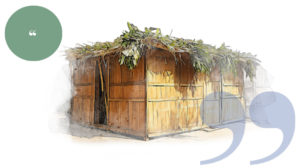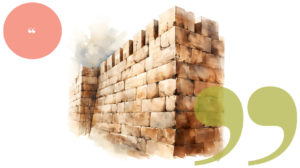AdviceLine: Issue 76
| February 3, 2008If your daughter’s torn, she should be speaking it out with her husband. The more the two of them learn to work things out on their own, the better off their marriage will be.
My daughter just called to ask my advice. She’s been married a few months, and she wants to know if she must accept her mother-in-law’s invitation for Shabbos. This would be the third consecutive Shabbos that she has been invited and she has already been there for the past two Shabbosos. I feel that she does not need to go. However, I am reluctant to advise my daughter. I’m afraid that my giving advice to my daughter on something that relates to his mother will upset her husband, even though he says he’s fine with whatever decision she makes. But then I think, why should I discourage my daughter from seeking my advice? How should I handle this?
Rabbi Dovid Orlofsky
There’s a saying that to be a successful in-law one must keep the mouth shut and the pocket open. I personally believe that parents should not interfere in the lives of their married kids. In the case you describe, where it seems like the other in-laws may already be a problem, you certainly wouldn’t want to become another one. The response to your daughter should be, “What do you want to do?” She has to make her own decisions.
If your daughter’s torn, she should be speaking it out with her husband. The more the two of them learn to work things out on their own, the better off their marriage will be. The majority of marriage problems come from communication difficulties, two people who haven’t mastered talking to each other. The last thing parents should do is hamper that process in any way. So send her to her husband.
Clearly, if we would be talking about a serious issue, or if you suspect that something was dangerous or unhealthy, then it would be in place for you to get involved. But the little things — which furniture to buy, where to spend Yom Tov — such issues should be between the couple.
When parents do mix in, it’s very often because they have their own agenda. They may be upset, thinking “Why are you going to the in-laws and not to me?” and feel that this is their chance to say their piece. But in the long run, this isn’t going to help them foster a relationship with their married child.
What we should be offering is not advice, but love, support, and lots of praise about how wonderful the couple is, and how we are confident that whatever they do, it will be great. Even though they will inevitably make mistakes. When that happens, we really need to be quiet.
Rabbi Moshe Shapiro, shlita, often says that chinuch today should be about teaching children how to become adults and giving them the tools to make the right decisions, but so often we hamper that and try to make all the decisions for them.
So what do we do when a married child approaches us for advice on a big issue — something medical, financial, or educational? First of all, make sure that both husband and wife want your opinion, not just one of them. Then sit down and help them think the issue through. Explore the various angles, discussing the pros and cons of each, so they can make the best decision for them. You shouldn’t be pushing your own agenda or trying to ram opinions down their throats. If one of their choices is really awful, you may have to be a bit more forthcoming, but in most situations, the choices are between two good, valid things.
Stepping back and letting married children find their own derech will actually ensure that they keep coming back to you. The less we say, the more they want to hear. And one more plus of letting them make their own decision is that, sometimes, the solutions they come up with will be even better than the ideas you had!
Rabbi’ Dovid Orlofsky is an internationally acclaimed lecturer and educator, loved for his powerful, yet humorous, talks. He has published various essays, including a chinuch column, and his tapes are popular worldwide. He is presently teaching at Ohr Somayach and Ohr LaGolah Leadership Institute in Jerusalem.
Mrs. Malli Rottenberg
Welcome to the world of in-law relationships! How easily they can become complicated and negative, and cause untold pain and disappointment.
The fact that your daughter asks you for advice shows that she has a good relationship with you and values your judgement. By asking you if she has to go again for a Shabbos to her in-laws, she shows her reluctance to go, and that she is looking to you for confirmation that she may decline.
You can help her to discover what her options are, and what the consequences would be so that she can arrive at her own conclusions. For example, if she goes to her mother-in-law every Shabbos will she feel resentful? Your daughter and son-in-law may wish to consider the possibility of spending one Shabbos in two or three on their own for mutual bonding. They may even want to spend an occasional Shabbos with their friends.
I am a firm believer in open and honest communication. If this issue is discussed with sensitivity and respect, it should be possible to arrange their Shabbos visits to suit both parties. Your daughter can say, “We really appreciate your invitations and the lovely meals you make, and we feel very welcome in your home. However, we would also like to spend some Shabbasos on our own, and hope you will understand.”
Relationships with in-laws require tact and consideration and willingness on both sides to compromise. Correctly handled, they can be a source of enrichment and mutual joy. The issue of boundaries springs to mind, which is important in all relationships. When appropriate boundaries are established early in a marriage they can prevent future misunderstandings and conflict.
It’s also important for your daughter to try to see this from her in-laws’ perspective. Parents invest a great deal of time, money, and energy bringing up their children, culminating in bringing them under the chuppah. Parents want and deserve all the nachas they have worked and prayed for. How are the children going to respond to that expectation? Treading the fine line between keeping quality time for themselves and respecting the wishes of their respective parents can be quite challenging, and it’s important to strike the right balance.
Your handling this positively by fostering open discussion can make it easier for your daughter and her husband to make decisions and learn the art of negotiation from a position of mutual understanding and trust. If you can help your daughter to master this skill, you will be doing her a great service. I wish you much hatzlachah.
Malli Rotenberg studied Psychology at the University of Manchester, England. She has had many years’ experience as a personal and marital counselor at the Jewish Marriage Council. She has run counseling courses at MST College and was involved in the training of counselors in Antwerp. She works in private practice in London and has children and grandchildren in London and Jerusalem.
Rebbetzin Esther Jungreis
A daughter should not be going to her mother for help in resolving problems in her marriage. An integral aspect of tzniyus is keeping marital issues within the marriage, and not discussing them with relatives or friends. It would be unhealthy for you get involved at this point, and could cause a rift in your daughter’s marriage. It can become “my mother” against “your mother,” and lead to no good.
Your message to your daughter should be something like this: “You are a married woman with a home of your own. This is something that needs to be worked out between the two of you. If you find that you can’t resolve this on your own, then consult with a professional — a Rav, Rebbetzin, or other expert. I’ll always be here for you if you need me, but it’s not good for me to be involved in issues that are between you and your husband. I would never want to hurt your shalom bayis in any way.”
Descended from a great rabbinic dynasty and a survivor of the Holocaust, Rebbetzin Esther Jungreis has devoted her life to battling the spiritual holocaust threatening our people. She is the founder and president of Hineni, one of the first kiruv organizations, as well as author of several transformative books, the most recent one being “Life’s a Test.”
(Originally featured in Family First, Issue 76)
Oops! We could not locate your form.











